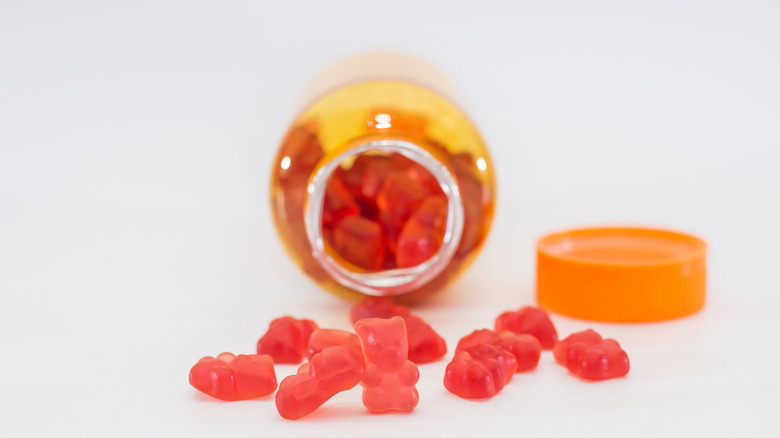Pill Versus Gummy Vitamins: What's The Difference?
If you were a Disney kid growing up, you may be familiar with the Mary Poppins adage that "a spoonful of sugar makes the medicine go down." Given how popular gummy vitamins have become over recent years, it appears many people may agree. Though they were originally created for children in the '90s, gummy vitamins have provided people of all ages a sweeter solution to receive their daily dose of vitamins.
Taking into consideration the fact that gummy vitamins are easy to chew, easy to swallow, are supposedly good for you, it's no wonder children and adults alike find them to be a delight. Sure, gummy vitamins may be more fun compared to traditional pill vitamins, how much do they really cater to your overall well-being? As it turns out, there are some key differences to ponder before swapping out all of your capsules and tablets for these seemingly healthy treats.
The sugar can stack up
"Gummy vitamins typically have 2 to 8 grams of sugar per serving," according to the Cleveland Clinic. Pills, on the other hand, usually don't contain any sugar. From dental health to diabetes, sugar can have a major impact on several aspects of your health — and people already exceed the recommended amount as it is (via Healthline).
The American Heart Association reported that, on average, Americans consume 77 grams of sugar every day. Taking into account that men should have a max of 36 grams of sugar and women shouldn't eat more than 25 grams of sugar, opting for gummy vitamins can add unnecessary amounts of sugar to your diet. With that being said, selecting sugar-free gummy vitamins may seem like a good idea but they can actually bring on a completely different set of problems.
Sugar-free gummies don't have any sugar as they're made from sugar alcohols. However, sugar alcohols may cause gas, lead to excess weight gain, and irritate those with irritable bowel syndrome (IBS), according to the Cleveland Clinic.
More reasons you may want to avoid gummy vitamins
Strict vegetarians and vegans may want to reconsider taking gummy vitamins, per Healthline. This is because the gelatin used to make gummies is an animal byproduct. This doesn't necessarily mean that any old traditional vitamin is a better alternative, as some capsule shells are also made of gelatin. If you are in need of a supplement that aligns with an animal-friendly lifestyle, look for capsules made of starch or hydroxypropyl methylcellulose (HPMC), advised a 2017 article published in the Indian Journal of Pharmacology.
One of the biggest concerns with choosing gummy vitamins over pills is that you may not be getting all of your nutrients. The Center for Science in the Public Interest reported that of the 37 gummy multivitamins they tested, none had sufficient levels necessary to be considered a viable substitute for a traditional multivitamin. On the other hand, some of the gummy vitamins examined actually contained too much vitamin A or folate. "Their nutrients are sometimes sprayed on," the report explained, "and since vitamins are more likely to degrade in a gummy, companies put in extra amounts. Sometimes too much extra, apparently."
According to the Mayo Clinic, consuming too much vitamin A can be harmful — especially for pregnant women as it can lead to birth defects. And, per Healthline, too much folate can have a negative effect on your blood.



